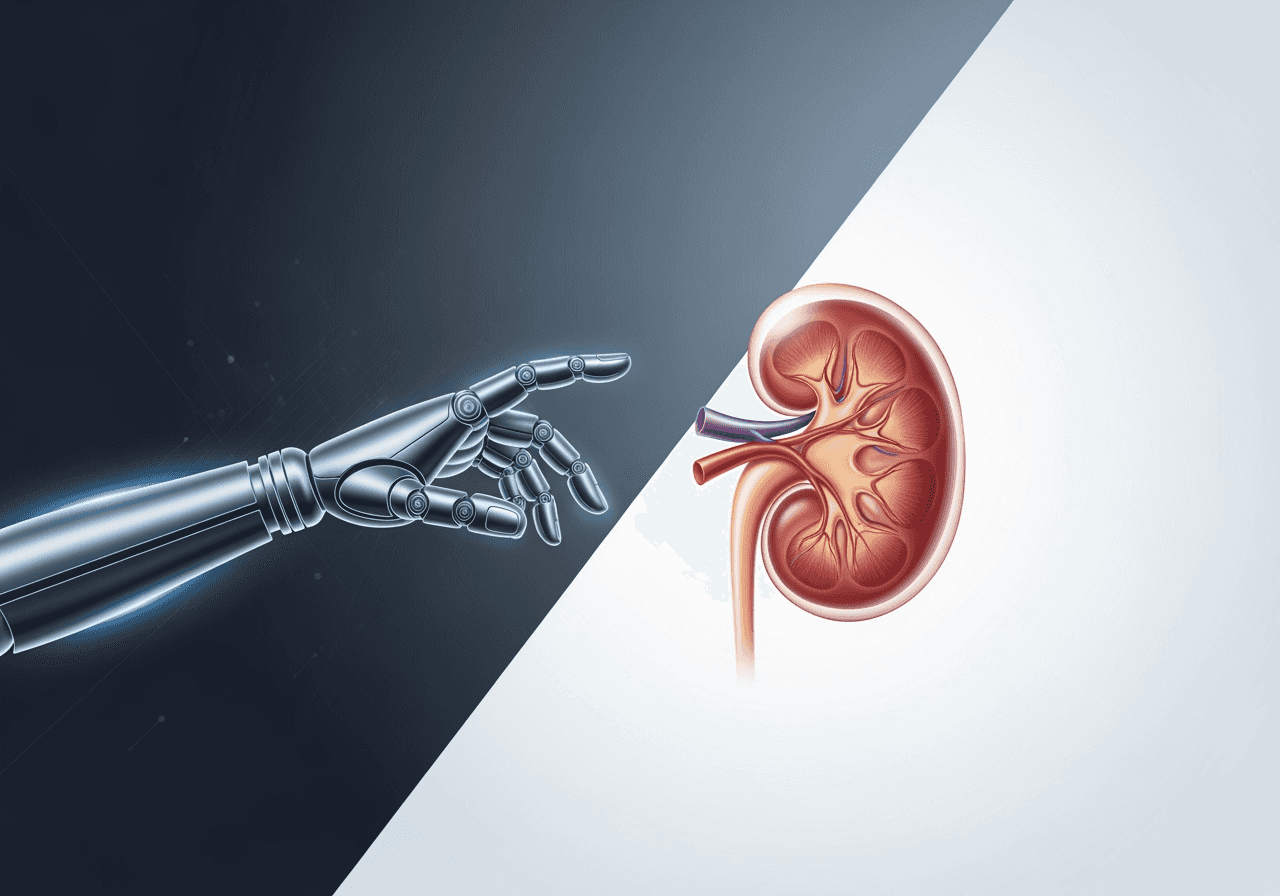
Advanced Robotic Technology Used in Kidney Transplant
30 Oct, 2025
 Healthtrip
Healthtrip- Where is Robotic Kidney Transplant Available?
- Why Choose Robotic Kidney Transplant? Benefits and Advantages < li>Who is a Suitable Candidate for Robotic Kidney Transplant?
- How is Robotic Kidney Transplant Performed? A Step-by-Step Guide
- Examples of Robotic Kidney Transplant Success Stories
- Hospitals Offering Advanced Robotic Kidney Transplant
- Conclusion
The Evolution of Kidney Transplantation
Traditional Kidney Transplantation
Traditional kidney transplantation, while a life-saving procedure, involves a relatively large incision and can result in significant post-operative pain and a prolonged recovery period. It requires meticulous surgical skills to ensure the transplanted kidney is properly connected to the recipient's blood vessels and urinary tract. While successful, traditional methods often lead to a higher risk of complications, such as wound infections, hernias, and longer hospital stays. Patients often experience considerable discomfort during the healing process, impacting their overall well-being. Healthtrip is dedicated to providing information and support to patients considering kidney transplantation, helping them understand the benefits and risks associated with different approaches. Also, with Healthtrip you can explore options at leading hospitals like Memorial Sisli Hospital that have perfected traditional methods over time.
Most popular procedures in India
The Rise of Robotic-Assisted Transplantation
Robotic-assisted kidney transplantation represents a significant leap forward, offering a minimally invasive alternative to traditional surgery. This approach utilizes advanced robotic systems, controlled by skilled surgeons, to perform the transplant through smaller incisions. These systems provide enhanced precision, dexterity, and visualization, allowing surgeons to navigate complex anatomical structures with greater ease. The benefits are numerous: reduced blood loss, less post-operative pain, smaller scars, and faster recovery times. Patients can often return to their normal lives sooner, experiencing a better quality of life post-transplant. For patients seeking the most advanced options, Healthtrip can connect you with facilities like Quironsalud Hospital Murcia that are at the forefront of robotic surgery.
How Robotic Technology Enhances Kidney Transplantation
Precision and Dexterity
Robotic systems offer unparalleled precision and dexterity compared to traditional surgical methods. The robotic arms can rotate 360 degrees, allowing surgeons to access hard-to-reach areas with ease. This is particularly beneficial when connecting the delicate blood vessels during the transplant. The enhanced precision minimizes the risk of damage to surrounding tissues and blood vessels, leading to fewer complications. The surgeon maintains complete control throughout the procedure, guiding the robotic arms with meticulous accuracy. Healthtrip recognizes the importance of precision in surgical outcomes and strives to provide patients with access to hospitals, such as Vejthani Hospital, that prioritize advanced technology and skilled surgeons who are adept in operating these robotic systems.
Wellness Treatments
Give yourself the time to relax
Lowest Prices Guaranteed!

Lowest Prices Guaranteed!
Improved Visualization
Robotic systems provide surgeons with a magnified, three-dimensional view of the surgical field. This enhanced visualization allows for a clearer understanding of the anatomical structures, enabling more accurate and efficient surgery. The improved depth perception and clarity reduce the risk of errors and enhance the overall surgical precision. Surgeons can identify and avoid critical structures, minimizing the potential for complications. Healthtrip understands that optimal visualization is key to successful surgery and can guide you to hospitals with cutting-edge imaging technology. Consider exploring facilities like Fortis Hospital, Noida for their commitment to incorporating advanced visualization tools in their surgical procedures.
Minimally Invasive Approach
The minimally invasive nature of robotic-assisted kidney transplantation translates to several benefits for patients. Smaller incisions result in less trauma to the body, leading to reduced blood loss, less post-operative pain, and a lower risk of infection. Patients typically experience a faster recovery and can return to their normal activities sooner. The smaller scars also offer a cosmetic advantage. Healthtrip is committed to promoting minimally invasive options that improve patient outcomes and quality of life. NMC Specialty Hospital, Al Nahda, Dubai, is among the many hospitals that Healthtrip partners with that prioritize minimally invasive surgical techniques, ensuring patients receive the best possible care with reduced recovery times.
Benefits of Robotic Kidney Transplantation
Reduced Pain and Faster Recovery
One of the most significant advantages of robotic kidney transplantation is the reduction in post-operative pain. Smaller incisions translate to less tissue damage and less pain, allowing patients to recover more comfortably. The faster recovery times enable patients to return to work and other activities sooner, improving their overall quality of life. Patients often require less pain medication, reducing the risk of side effects. Healthtrip understands that a comfortable and speedy recovery is a top priority for patients, so we highlight centers like Saudi German Hospital Cairo, Egypt known for their patient-centric approach and focus on post-operative care.
Lower Risk of Complications
The enhanced precision and minimally invasive nature of robotic surgery contribute to a lower risk of complications. The risk of wound infections, hernias, and bleeding is significantly reduced. The precise suturing of blood vessels minimizes the risk of thrombosis and other vascular complications. Patients experience fewer post-operative issues, leading to better overall outcomes. Healthtrip is dedicated to connecting patients with medical facilities that prioritize safety and minimize the risk of complications. Hisar Intercontinental Hospital is an example of facilities that are very keen on preventing complications.
Improved Long-Term Outcomes
Studies have shown that robotic kidney transplantation can lead to improved long-term outcomes. The reduced risk of complications and faster recovery times contribute to better overall health and well-being. Patients experience improved graft survival rates and a reduced need for immunosuppressant medications. The minimally invasive approach may also reduce the risk of chronic pain and other long-term issues. Healthtrip's mission is to ensure patients have access to the best possible care for long-term health and well-being, by connecting them with hospitals such as Bangkok Hospital that emphasize comprehensive post-transplant care and monitoring.
The Future of Robotic Transplantation
Advancements in Technology
The field of robotic surgery is constantly evolving, with ongoing advancements in technology. New robotic systems are being developed with enhanced capabilities, including improved imaging, greater dexterity, and more intuitive controls. Artificial intelligence and machine learning are being integrated into robotic systems to assist surgeons with decision-making and improve surgical outcomes. Future advancements may include the development of fully autonomous robotic systems capable of performing complex surgical procedures with minimal human intervention. Healthtrip remains at the forefront of these advancements, ensuring that patients have access to the most cutting-edge technology available. We will be listing hospitals like Mount Elizabeth Hospital that are adopting new technologies within no time.
Expanding Access to Robotic Surgery
As robotic technology becomes more widespread, access to robotic kidney transplantation is expanding. More hospitals are investing in robotic systems and training surgeons in robotic techniques. The increasing availability of robotic surgery is making it possible for more patients to benefit from this advanced approach. Healthtrip is committed to bridging the gap and ensuring that patients around the world have access to the best possible medical care, by partnering with a growing network of hospitals and medical centers offering robotic surgery. We are constantly adding hospitals and doctors on our website.
Healthtrip's Role in Facilitating Access
Healthtrip plays a crucial role in connecting patients with advanced robotic kidney transplantation services. We provide comprehensive information about robotic surgery, including its benefits, risks, and potential outcomes. We partner with leading hospitals and medical centers around the world that offer robotic kidney transplantation. Our experienced team assists patients with every step of the process, from initial consultation to post-operative care, ensuring a seamless and stress-free experience. Healthtrip's mission is to empower patients with the knowledge and resources they need to make informed decisions about their health and access the best possible care, like at Fortis Memorial Research Institute, Gurgaon, making the journey to improved health as smooth as possible.
Where is Robotic Kidney Transplant Available?
Finding the right place for a robotic kidney transplant is a crucial first step in your journey towards better health. The good news is that this advanced procedure is becoming increasingly available around the world, though it's still not as widespread as traditional kidney transplants. While the exact availability can change, some regions are emerging as hubs for robotic kidney transplant expertise. In countries like India, you'll find centers of excellence such as Fortis Memorial Research Institute, Gurgaon and Max Healthcare Saket, both offering the latest in robotic surgical techniques. These hospitals often boast experienced transplant teams and cutting-edge technology, making them attractive options for international patients seeking quality care. Similarly, Turkey has become a popular destination for medical tourism, with reputable hospitals like LIV Hospital, Istanbul and Hisar Intercontinental Hospital offering robotic kidney transplants. In Europe, Spain is making strides in advanced surgical procedures; you might want to consider institutions such as Quironsalud Hospital Murcia or Jiménez Díaz Foundation University Hospital in Madrid. These hospitals are known for their commitment to innovation and patient-centered care. Remember to do your research, compare different centers, and consider factors like the hospital's experience with robotic kidney transplants, the expertise of the surgical team, and the overall cost of treatment.
Before making any decisions, reach out to hospitals directly to get detailed information about their programs, success rates, and the specific robotic technology they use. Exploring options with Healthtrip can streamline this process, providing you with personalized guidance and connecting you with reputable hospitals based on your individual needs. Remember that traveling for medical treatment can be a significant undertaking, so it's essential to choose a location and hospital that you feel comfortable and confident in. Ultimately, the best place for your robotic kidney transplant is the one that offers the highest quality care, the most experienced surgeons, and a supportive environment throughout your journey.
Why Choose Robotic Kidney Transplant? Benefits and Advantages
So, why all the buzz about robotic kidney transplants? Well, imagine a surgeon operating with enhanced precision, using tiny instruments to delicately perform a complex procedure. That's essentially what robotic surgery offers. One of the biggest advantages is smaller incisions. Instead of a large cut, robotic surgery typically involves just a few small punctures, which translate to less pain, less scarring, and a faster recovery time. For patients who have already been through so much with kidney disease, this can make a world of difference. Think about getting back to your daily life sooner, with less discomfort. Another benefit is the improved visualization that the robotic system provides. Surgeons get a magnified, 3D view of the surgical site, allowing them to see structures more clearly and operate with greater accuracy. This can be particularly important when working around delicate blood vessels and tissues during a kidney transplant. The enhanced precision of the robot can also lead to fewer complications during and after surgery. Research suggests that robotic kidney transplants may result in lower rates of wound infections, bleeding, and other common surgical issues. From a patient's perspective, that means less risk and a smoother overall experience. Plus, robotic surgery can sometimes make kidney transplants possible for patients who might not be good candidates for traditional open surgery due to weight or other health conditions.
Beyond the immediate surgical benefits, robotic kidney transplant can lead to improved long-term outcomes. Studies have shown that patients who undergo robotic transplants may have better kidney function and a lower risk of rejection compared to those who have open surgery. This could be due to the reduced trauma to the body and the increased precision of the robotic technique. While robotic kidney transplant isn't necessarily the right choice for everyone, it's definitely worth considering if you're looking for a less invasive, potentially safer, and faster way to get a new kidney. It's important to discuss the pros and cons with your doctor to determine if you're a good candidate. And remember, Healthtrip can help you find hospitals and surgeons with expertise in robotic kidney transplant, making the process of exploring your options a little less daunting.
Who is a Suitable Candidate for Robotic Kidney Transplant?
Deciding if robotic kidney transplant is right for you involves a careful evaluation of your overall health and specific medical situation. It's not a one-size-fits-all solution, and your doctor will consider several factors before recommending this type of procedure. Generally, good candidates for robotic kidney transplant are those who are in relatively good health aside from their kidney disease. This means having well-managed diabetes, heart conditions, or other underlying health issues. Uncontrolled medical problems can increase the risk of complications during and after surgery, regardless of whether it's a robotic or traditional transplant. Your weight can also play a role. While robotic surgery is often a good option for overweight individuals due to the smaller incisions and reduced risk of wound complications, extremely obese patients may still face challenges. The surgeon will need to assess whether the robotic system can safely and effectively access the surgical site. Previous abdominal surgeries can also affect your candidacy. If you've had multiple surgeries in the past, there may be scar tissue that makes it difficult for the robot to navigate. However, in many cases, experienced robotic surgeons can work around these challenges. Your vascular health is another important consideration. The blood vessels that will be connected to the new kidney need to be in good condition to ensure proper blood flow. If you have significant blockages or other vascular problems, your doctor may recommend further evaluation or treatment before considering a transplant.
Beyond these physical factors, your commitment to following post-transplant care instructions is crucial. This includes taking immunosuppressant medications as prescribed, attending regular follow-up appointments, and making lifestyle changes to protect your new kidney. Robotic kidney transplant offers many potential benefits, but it's not a magic bullet. Success depends on a team effort between you and your medical team. If you're curious about whether you might be a candidate for robotic kidney transplant, the best thing to do is talk to your doctor and a transplant specialist. They can evaluate your individual situation and help you make an informed decision. Healthtrip can also assist you in finding qualified specialists and hospitals that offer robotic kidney transplant, making it easier to explore your options and get the information you need.
Also Read:
How is Robotic Kidney Transplant Performed? A Step-by-Step Guide
Robotic kidney transplant, while sounding like something out of a sci-fi movie, is a very real and increasingly popular surgical technique. It's essentially kidney transplant surgery assisted by a sophisticated robotic system. Think of it as giving the surgeon enhanced precision and dexterity, allowing them to perform the operation through smaller incisions. This minimally invasive approach offers numerous benefits for the patient. The entire process is overseen by a highly skilled transplant team, ensuring patient safety and optimal outcomes. Let's break down the typical steps involved in a robotic kidney transplant.
First, the patient undergoes a thorough pre-operative evaluation. This includes blood tests, imaging studies, and consultations with nephrologists, surgeons, and anesthesiologists. The goal is to assess the patient's overall health and determine their suitability for robotic surgery. Once cleared, the patient is admitted to the hospital and prepared for surgery. Anesthesia is administered, and the surgical site is prepped and draped. The surgical team then strategically places small incisions, typically around the abdomen. These incisions serve as entry points for the robotic arms and camera.
Next comes the magic—the robotic system! The surgeon sits at a console in the operating room, controlling the robotic arms with incredible precision. The robot's high-definition, 3D camera provides a magnified view of the surgical field, allowing for enhanced visualization. Using the robotic arms, the surgeon carefully dissects and prepares the space for the new kidney. The donor kidney is then carefully inserted through one of the incisions. The surgeon meticulously connects the renal artery, renal vein, and ureter (the tube that carries urine from the kidney to the bladder) to the recipient's corresponding vessels and bladder. This requires great accuracy to ensure proper blood flow and urine drainage.
Once the connections are complete, the surgical team thoroughly checks for any leaks or complications. The incisions are then closed, and the patient is transferred to the recovery room. Post-operative care involves monitoring kidney function, managing pain, and preventing infection. Immunosuppressant medications are crucial to prevent the body from rejecting the new kidney. Rehabilitation starts soon after the surgery to help the patient regain strength and mobility. Now doesn't that sound like a smoother journey than traditional surgery? It often is!
Also Read:
Examples of Robotic Kidney Transplant Success Stories
Hearing about medical procedures can be a bit daunting, but when you hear personal success stories, it can be truly inspiring, right? Robotic kidney transplants are no exception. They've transformed lives, offering hope and renewed health to individuals battling kidney failure. One story that comes to mind is that of a 55-year-old gentleman who had been on dialysis for several years. Dialysis, while life-saving, can be incredibly taxing on the body and lifestyle. After undergoing a robotic kidney transplant, he was able to ditch dialysis, regain his energy, and enjoy activities he hadn't been able to participate in for years, such as hiking and traveling. He even mentioned feeling like he had a new lease on life!
Then there's the case of a young mother in her early 40s whose kidney disease was seriously impacting her ability to care for her children. The thought of traditional open surgery with its longer recovery time was a major concern for her. Thankfully, she was a suitable candidate for a robotic kidney transplant. The minimally invasive approach allowed her to recover much faster, and she was back home with her family within a week, able to resume her role as a loving and active mother. These stories aren't isolated incidents. Numerous studies and patient testimonials highlight the positive outcomes associated with robotic kidney transplants. These include shorter hospital stays, reduced pain, smaller scars, and a quicker return to normal activities. What's not to love about that?
It’s important to note that success also relies on expert aftercare and adherence to medical advice. Patients who follow their post-transplant medication schedules and attend follow-up appointments generally experience better long-term outcomes. Plus, knowing that you're in good hands, with a skilled surgical team using state-of-the-art technology, can make all the difference in your peace of mind throughout the process. Remember, while every individual’s experience is unique, these success stories paint a picture of hope and possibility for those considering kidney transplantation.
Also Read:
Hospitals Offering Advanced Robotic Kidney Transplant
Finding the right hospital for a robotic kidney transplant is a crucial step in your healthcare journey. You want a facility that not only boasts state-of-the-art technology but also has a team of experienced surgeons and transplant specialists. Thankfully, Healthtrip can help you navigate the options and connect you with world-class medical centers. Several hospitals around the globe are recognized for their excellence in robotic kidney transplantation. In India, you might consider Fortis Escorts Heart Institute, Fortis Shalimar Bagh, Fortis Hospital, Noida, Fortis Memorial Research Institute, Gurgaon, and Max Healthcare Saket. These facilities have established transplant programs and utilize the latest robotic technology.
If you're looking at options in Turkey, Memorial Bahçelievler Hospital, Memorial Sisli Hospital, LIV Hospital, Istanbul, and Hisar Intercontinental Hospital are worth exploring. They are known for their comprehensive transplant services and experienced surgical teams. Over in Thailand, Bangkok Hospital and Vejthani Hospital are popular choices for medical tourists seeking advanced treatments, including robotic kidney transplants. These hospitals offer a combination of skilled surgeons and modern facilities.
In Spain, you could consider Quironsalud Hospital Toledo, Quironsalud Hospital Murcia, and Jiménez Díaz Foundation University Hospital, which are part of a larger network known for its commitment to innovation and patient care. For those in the United Arab Emirates, NMC Specialty Hospital, Al Nahda, Dubai, and NMC Royal Hospital, DIP, Dubai, offer advanced medical facilities and experienced transplant teams. Finally, Mount Elizabeth Hospital and Singapore General Hospital in Singapore are renowned for their high standards of medical care and expertise in transplantation. Remember to thoroughly research each hospital and consult with your doctor to determine the best fit for your individual needs and circumstances. Healthtrip can assist you in gathering information, comparing options, and making informed decisions along the way.
Also Read:
Conclusion
Robotic kidney transplant represents a significant advancement in the field of transplantation, offering patients a less invasive and potentially more comfortable surgical experience. From smaller incisions and reduced pain to faster recovery times and improved cosmetic outcomes, the benefits are compelling. As we've explored, the procedure involves meticulous planning, advanced robotic technology, and a team of skilled medical professionals. The success stories speak volumes about the transformative impact this surgery can have on individuals suffering from end-stage renal disease, allowing them to reclaim their health and quality of life. But as with any medical procedure, it's crucial to understand the process, evaluate your suitability, and choose a reputable hospital with experienced surgeons.
Healthtrip is here to guide you on this journey, providing you with the information and resources you need to make informed decisions. We can help you connect with leading hospitals and transplant specialists around the world, ensuring you receive the best possible care. Whether you're just starting to explore your options or are ready to move forward with a robotic kidney transplant, Healthtrip is your trusted partner. Our goal is to empower you with knowledge and support, so you can confidently navigate the complexities of medical travel and achieve a positive outcome. Don't hesitate to reach out to us for personalized assistance and expert guidance. Your health and well-being are our top priorities.
Also Read:
Related Blogs

Long-Term Follow-Up After Plastic Surgery
Detailed insights into plastic surgery – doctors, hospitals, technology, recovery,

Healthtrip’s Transparency in Plastic Surgery Pricing and Packages
Detailed insights into plastic surgery – doctors, hospitals, technology, recovery,

Frequently Asked Questions About Plastic Surgery
Detailed insights into plastic surgery – doctors, hospitals, technology, recovery,

Advanced Robotic Technology Used in Plastic Surgery
Detailed insights into plastic surgery – doctors, hospitals, technology, recovery,

How Healthtrip Supports Foreign Patients for Plastic Surgery in India
Detailed insights into plastic surgery – doctors, hospitals, technology, recovery,

Top Medical Packages for Plastic Surgery Offered by Healthtrip
Detailed insights into plastic surgery – doctors, hospitals, technology, recovery,










